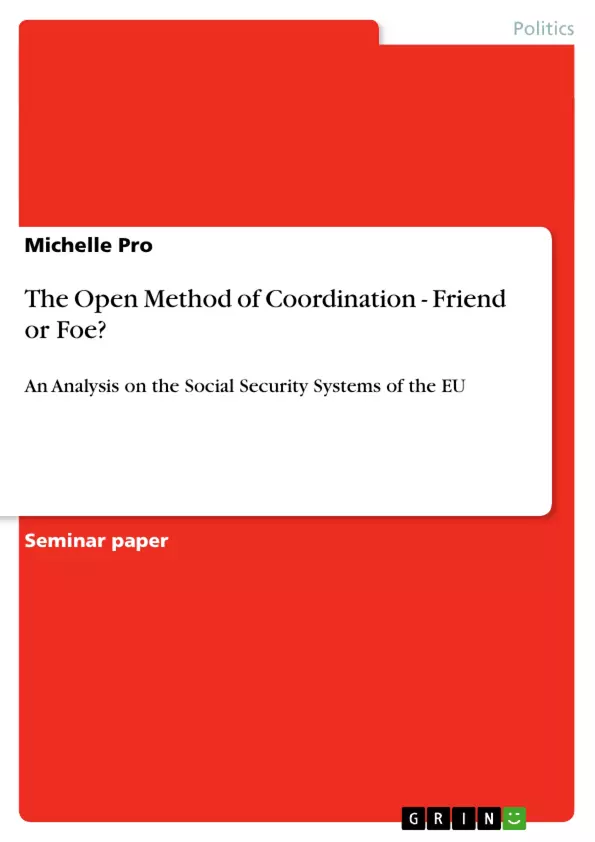Content
1. Abstract …........................................................................................................ 2
2. The OMC – An Overview …............................................................................ 3
2.1. The Open Method of Coordination –Decentralized Coordination …... 3
2.2. The Actors Involved …......................................................................... 6
3. The OMC and the Old-Age Security System .................................................. 7
3.1. Bismarck vs. Beveridge ….................................................................... 7
3.2. Different Approaches on the Old-Age Security Issues …..................... 8
4. Examples of Pension Systems …..................................................................... 10
4.1. Germany …........................................................................................... 10
4.2. Sweden …............................................................................................. 12
5. Conclusion …................................................................................................... 13
6. References ….................................................................................................. 14
1
Inhaltsverzeichnis (Table of Contents)
- Abstract
- The OMC - An Overview
- The Open Method of Coordination - Decentralized Coordination
- The Actors Involved
- The OMC and the Old-Age Security System
- Bismarck vs. Beveridge
- Different Approaches on the Old-Age Security Issues
- Examples of Pension Systems
- Germany
- Sweden
- Conclusion
Zielsetzung und Themenschwerpunkte (Objectives and Key Themes)
This term-paper aims to analyze the potential impact of the Open Method of Coordination (OMC) on the old-age security systems of the European Union. The paper will explore the OMC's origins, functioning, and key actors. It will then investigate how the OMC influences pension reforms, drawing on examples from Germany and Sweden. The analysis aims to determine whether the OMC is a suitable process for promoting development and necessary reforms in old-age security systems. Key themes include: * The Open Method of Coordination and its impact on social security convergence. * The role of the OMC in promoting best-practice models for pension reforms. * The comparison of different pension system models and their implications for the OMC. * The effectiveness and efficiency of the OMC as a policy-making instrument. * The challenges and opportunities presented by the OMC for the harmonization of old-age security systems within the European Union.Zusammenfassung der Kapitel (Chapter Summaries)
This section of the preview omits the summaries of the conclusion and final chapter to avoid revealing major conclusions or spoilers.Abstract
The abstract introduces the concept of the Open Method of Coordination (OMC) and its role in promoting convergence of social security systems within the European Union. It highlights the OMC's "soft law" approach, which aims to foster learning and best-practice sharing rather than imposing strict regulations. The paper's objective is to analyze the OMC's potential impact on old-age security systems.The OMC - An Overview
This chapter provides an overview of the Open Method of Coordination, including its origins, principles, and mechanisms. It emphasizes the OMC's decentralized approach, which relies on member states to develop and implement their own national strategies based on best-practice models. The chapter also outlines the four main elements of the OMC, including the setting of guidelines and objectives, the establishment of indicators and benchmarks, the translation of European guidelines into national policies, and the monitoring and evaluation of progress.The OMC and the Old-Age Security System
This chapter examines the OMC's potential impact on old-age security systems, focusing on the contrasting approaches to pension provision embodied by Bismarck and Beveridge models. It explores the different challenges and opportunities faced by member states in reforming their pension systems and the extent to which the OMC can contribute to effective solutions.Examples of Pension Systems
This chapter provides specific examples of pension systems in Germany and Sweden, highlighting the differences in their approaches and their experiences with pension reforms. The analysis examines how the OMC has influenced these reforms and whether it has contributed to convergence.Schlüsselwörter (Keywords)
This paper focuses on the Open Method of Coordination (OMC), a decentralized policy-making instrument that aims to promote convergence of social security systems within the European Union. The paper explores the OMC's application to old-age security systems, comparing different pension models and analyzing the OMC's potential to foster best-practice sharing and policy innovation. Keywords include: Open Method of Coordination, social security, convergence, pension reform, Bismarck model, Beveridge model, best-practice, policy innovation, European Union.Frequently Asked Questions
What is the Open Method of Coordination (OMC)?
The OMC is a decentralized, "soft law" policy-making instrument in the EU that uses benchmarking and best-practice sharing to promote convergence in social policies.
How does the OMC influence pension reforms?
It sets common objectives and indicators, allowing member states to learn from each other's old-age security systems, such as the Bismarck or Beveridge models.
What is the difference between Bismarck and Beveridge models?
The Bismarck model is based on social insurance and employment contributions, while the Beveridge model focuses on universal coverage financed through taxes.
How have Germany and Sweden used the OMC?
The paper analyzes how these countries adapted their pension systems in light of European guidelines, using the OMC to foster policy innovation and structural reforms.
Is the OMC effective for social security convergence?
While it encourages learning, its non-binding nature presents challenges for strict harmonization across the diverse security systems of EU member states.
- Quote paper
- M.A. Michelle Pro (Author), 2011, The Open Method of Coordination - Friend or Foe?, Munich, GRIN Verlag, https://www.grin.com/document/208341



